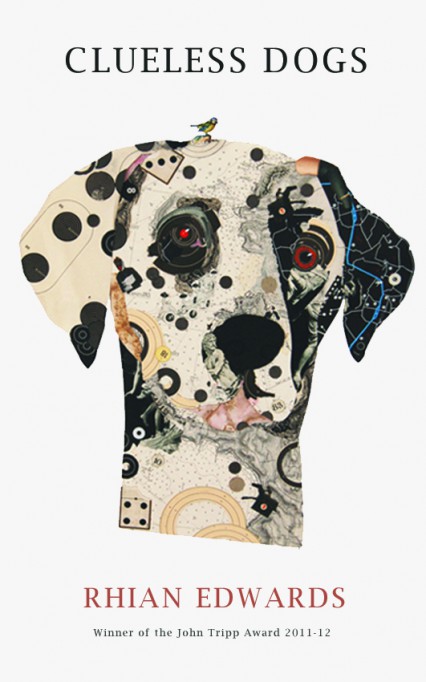Carl Griffin attends a live reading by Rhian Edwards of her latest poetry collection Clueless Dogs.
Rhian Edwards, though young in age, already has plenty of experience when it comes to performing. She has delivered over 300 stage, radio and festival performances worldwide. Closer to home, she also won the John Tripp Award for Spoken Poetry 2011-12.
But a strange transformation takes place within her vocal cords when she stands at the microphone. Her customary attractive voice becomes a ventriloquist’s wailing; a wailing not in any way influenced by Bridgend, where Rhian is from, unless it’s to disguise her Welsh accent, an accent in general which really stands out when reading in England or overseas. Unique? Definitely. Entertaining? Well, the audience always seem to think so at a Rhian Edwards reading, so who I am to fault it? But isn’t it off-putting when the poet performing his or her work reads so differently to the way he or she normally speaks? The great Robin Robertson gets away with it, and now, it seems, Rhian Edwards does too.

Rhian Edwards – Clueless Dogs (Live)
Poets at the DTC
Dylan Thomas Centre
The other thing immediately noticeable about Rhian Edwards is that she reads from memory, an exceedingly impressive feat considering a lack of rhyme and repetitive rhythm means her poetry doesn’t lend itself well to memorisation.
Reading from her debut collection, Clueless Dogs, half of which is littered with character portraits, the other half love poems, Edwards switches between the two major themes but starts off by delving into the latter with her usual opener, ‘Tiptoe’. With the exception of the closing stanza, the last of nine, the poem relies too heavily on rhythm and word play to entertain, masking the lukewarm imagery and lack of emotional punch. The central sentiment is feeble and by the time the poem reaches its lowest point you will surely have had enough:
I’m walking dead to you, bereft of you,
with crumbs of poems left of you,
armed with a memory now for forgetting you.
The gimmickry, regrettably, is not so easy to forget because it is recycled and developed (to an extreme which will test the patience of anyone with half a fondness for variety) in ‘Girl Meats Boy’, a daft commissioned poem inspired by her boyfriend, a chef. Asking herself what her boyfriend’s favourite meal was, she says, she played with the idea that her boyfriend was the meal. The finale of ‘Tiptoe’ is symbolic to the reading as a whole, mediocrity and weirdness overcome by brilliance. The closing stanza brings to the forefront a personal sense of failure and a loss of control, effortless to relate to, in what is essentially a natural part of life:
And when that thought has passed,
have I left my mark?
Not even a foot print
of me now remains.
The stronger of Rhian Edwards’ poems are more normal and everyday in their subject matter. From a typical parents’ evening at school to a Skype session on the internet with her boyfriend, these glimpses of life, these little moments, we have all gone through, or can easily imagine going through, make a strong impression. Though obviously born to perform, the real talent of Rhian Edwards may lie in subtleties.
That said, Edwards complemented the poetry with three songs, ‘The Seamstress’, ‘The Beginning’ and ‘Someone Else’. Her voice when she sings becomes a thing of beauty, teasing out the haunting lyrics, and can almost bring a grown man to tears.
To round off the poetry came possibly the strongest poem in Clueless Dogs, ‘Pest Controller’, which, in a way, retains the beauty conjured up by the songs. Battling mice, the poet gets a pest controller round, explaining to him that she is a poet and to excuse her ‘bedlam hair, ramshackle clobber’. Their dialogue changes the direction of the poem:
What kind of stuff do you write? He asked,
sticking his head in the bathroom cupboard
while fiddling for daydreaming vermin.
Love poems, the dark side, I said
The response of the pest controller surprises her, and this is what makes the best poetry, a result the poet did not expect yet had to go through the usual rituals, the smalltalk and the probing, the setting and the starting point, to obtain:
Then you don’t know what love is, he said,
shaking poisoned grain into boxes
as if he were emptying a sweet jar.
And Rhian Edwards’ greatest strength is that her performances bring about results you do not expect. The strange voice is only a side issue. The stronger poems are easily worth the uncomfortable moment of growing accustomed to it, and to the strange world of a Rhian Edwards poetry reading.
Upcoming events at the Dylan Thomas Centre include the Terry Hetherington Awards Evening (June 22nd), John Harrison: Forgotten footprints (June 27th) and the next Poets at the DTC with Anne-Marie Fyfe (June 28th).










